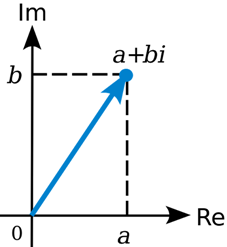Addition of Complex Number: Let z₁ = a₁ + ib₁ and z₂ = a₂ + ib₂ be two complex numbers. Then their sum z₁ + z₂ is defined as the complex number (a₁ + a₂) + I (b₁ + b₂).
Subtraction of Complex Number: Let z₁ = a₁ + ib₁ and z₂ = a₂ + ib₂ be two complex numbers. Then the subtraction of z₂ from z₁ is denoted by z₁ – z₂ and is defined as the addition of z₁ and – z₂.
Multiplication of Complex Number: Let z₁ = a₁ + ib₁ and z₂ = a₂ + ib₂ be two complex numbers. Then the multiplication of z₁ with z₂ is denoted by z₁z₂ and is defined as the complex number (a₁ a₂ – b₁b₂) + i (a₁b₂ + a₂b₁).
Division of Complex Number: The division of a complex numbers z₁ by a non-zero complex number z₂ is defined as the multiplication of z₁ by the multiplicative inverse of z₂ and is denoted by z₁/z₂.
Modulus of a Complex Number: The modulus of a complex number z = a + ib is denoted by |z| and is defined as \(\left| z \right|=\sqrt{{{a}^{2}}+{{b}^{2}}}=\sqrt{{{\left\{ \operatorname{Re}\left( z \right) \right\}}^{2}}+{{\left\{ \operatorname{Im}\left( z \right) \right\}}^{2}}}\). Clearly, |z| ≥ 0 for all z ϵ C.
Clearly, |z| ≥ 0 for all z ϵ C.
Example: If z₃ = 1 + √(-3) then find the module of z₃.
Answer: |z₃| = |1 | i√3| = \(\sqrt{{{1}^{2}}+{{\left( \sqrt{3} \right)}^{2}}}\) = 2.
